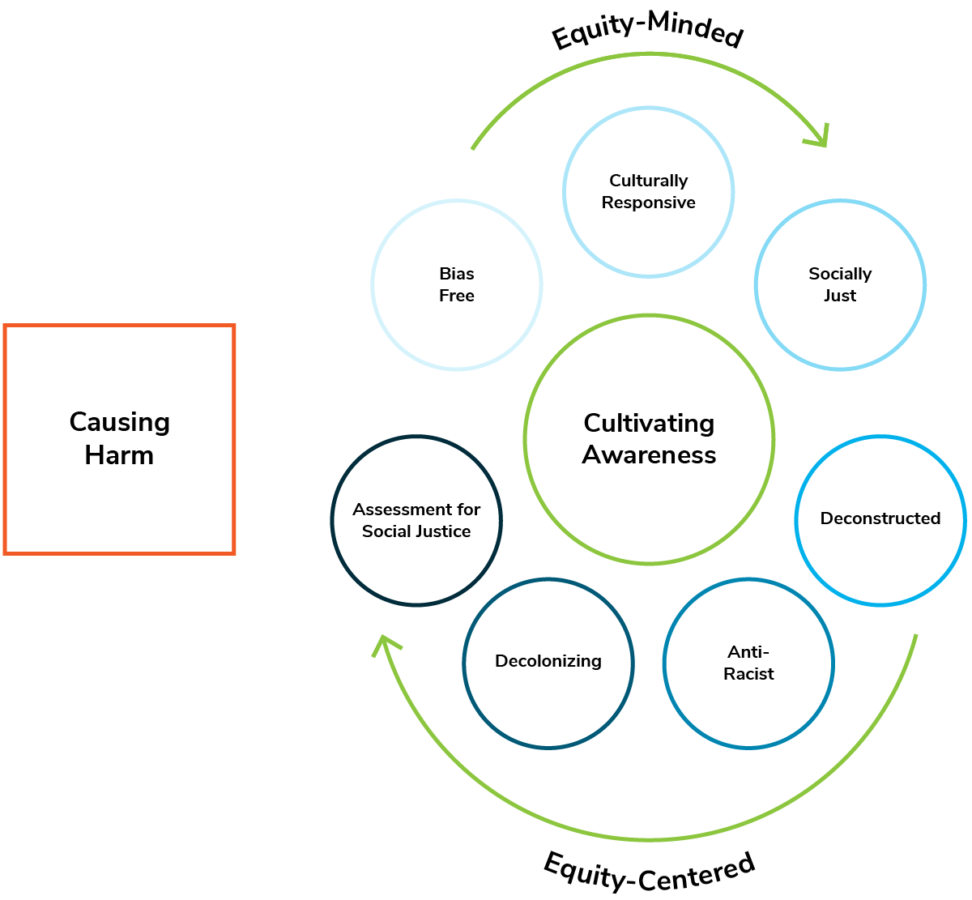
Increasing Awareness and Reducing Harm: A Framework for Equity-Minded and Equity-Centered Assessment
Higher education has inequitable outcomes for marginalized student populations, particularly Black, Indigenous, and People of Color (BIPOC) students. In light of high-profile racial injustice in U.S. society at large, and the disparate impacts of a global pandemic, colleges and universities have recently moved more proactively to address these inequities in college outcomes through student support programs, the re-examination of the curriculum and investigation of policies and processes. For institutions to understand the impact of their efforts, they conduct assessment. Many of these assessment practices focus on investigating the efficacy of diversity, equity, and inclusion (DEI) programs and services, disaggregating learning data to reveal differences in student outcomes, evaluating student belongingness and marginality or assessing campus climate. While these are important practices that must continue, colleges and universities have an opportunity and responsibility to examine and dismantle their inequitable systems and impact society by assessing and working to dismantle the systems of power and oppression embedded in American higher education. From this vantage point, assessment is not simply an “objective” process or a set of replicable procedures but should be conceived as a practice that attends more fully to the social and political position that it occupies within institutions.
Until recently, the higher education dialogue and literature regarding the intersection between DEI and assessment scholarship, approaches and methods has been lacking. Those in the field who publish and present on this intersection have used various terminology to articulate this intersection. Practitioners find incorporating equity into assessment practice confusing and challenging. For examples, as institutions increasingly prioritize their equity agenda and associated metrics to hold themselves accountable, the purpose and focus of assessment practice shifts. In addition to collecting student learning outcomes data, institutions may concurrently evaluate the biases embedded within their learning outcomes framework, the implicit bias in their course evaluation instruments, administration and use of results, as well as the course content, teaching approaches, instructor professional development, and the ways in which use of those results are used in the promotion and tenure.
A Framework for Equity-Minded and Equity-Centered Assessment
While the literature regarding equity-centered and related forms of assessment are growing, there are limited models of practice to illustrate the types of practices. Reflecting on assessment’s philosophical assumptions and methods and the racist, heteronormative, gendered systems of power and oppression embedded within higher education (and therefore within assessment practices) we originally viewed the various terminology and concepts regarding the intersection of assessment and DEI as existing on a continuum, characterized by increasing levels of individual action to address in equity.

Over the past three years, we have engaged in writing, thinking, dialogue, conference presentations and review of the assessment and equity literature and our thought process has evolved. We are now considering these elements as lenses or approaches where assessment practitioners have an opportunity to move beyond using assessment to investigate student learning and success within existing harmful and oppressive structures, but to actively use assessment as a method for recognizing systemic barriers and using those results to dismantle those systems in a way that reframes and reconstructs higher education practices and environments so that they are equitable for all. Using this lens, there is no neutral – practices, policies, the curriculum and services – are either advancing equity for those most marginalized or they are barriers to student success. The sections of the framework are not linear or mutually exclusive. Below are descriptions of the various elements in the framework.

Cultivating Awareness to Reduce Harm
Situated outside the framework are unexamined assessment practices that intentionally or unintentionally cause harm. While assessors often adhere by ethical principles related to data collection and analysis and IRB mandates to protect participants, this alone does not ensure that they will not cause harm. A lack of awareness that we live in a dominant culture where we have all internalized racism (and other isms), that systemic oppression impacts privileged and marginalized peoples differently, and that systemic oppression is present in all our institutional practices causes harm. Many widely accepted methods and instruments signal discriminatory or biased messages, trigger microaggressions, focus on student deficits rather than structural barriers and do not center equity.
Cultivating awareness is centered in the framework, recognizing that any attempt to advance educational equity starts with the self. Assessors start by engaging in awareness, learning and reflection around their identity, privilege, power and agency, exploring their biases and cultural assumptions. They take personal responsibility for their intention and their impact. Their approach is collaborative, inclusive, relational and respectful. They insert a pause when more reflection or dialogue is needed. Cultivating awareness and working to reduce bias and harm are ongoing lenses embedded throughout all approaches in the model.
Encircling the framework are two ways of thinking about assessment practices to advance equity. Equity-mindedness means approaching assessment with an awareness of the social and historical context of exclusionary practices in higher education and adopting a mode of thinking that calls attention to patterns of inequity. Equity-minded practitioners acknowledge the history of oppression and colonization within which assessment is being conducted; recognize and move to interrupt inequitable systems; investigate and discuss who decides and benefits from assessment; consider how value is attached to what is measured; critique how meaning is attached to data and results; and recognize and address the extent to which their assessment work prevents structural transformations and equity. The goal with equity-minded assessment is to conduct assessment in an equitable way. There are three approaches in the equity-minded part of the framework: bias-free, culturally responsive, and socially-just assessment.
The goal in bias-free assessment is to reduce bias throughout the assessment cycle. Examples may include over-sampling students from minoritized populations to ensure they are sufficiently represented in the sample used in the assessment or ensuring that response options for demographic questions in a survey are inclusive.
In culturally responsive assessment, individual culture is taken into consideration when gathering data. One example may include offering data collection for retention exit interviews in Spanish or orally for deaf individuals. Culturally responsive assessment will also ensure that a variety of data collection methods are used as individuals express their learning in different ways. When gathering data to determine why students stay at an institution, methods may include survey, interview, journals, ethnographic essays, etc. Data will also be disaggregated by demographic group to see how results may be different across groups. But caution is taken not to treat any social identity (such as race/ethnicity) as a “cause” for any differences.
Socially just assessment is built on a critical paradigm that considers agency, power and voice, among other elements. The difference with this level is that not only is bias being addressed and culture taken into consideration, but power differentials are also acknowledged in each step of the assessment process. An example might be an assessment of retention that seeks to understand the impact of campus climate on student’s continuation at an institution.
Equity-centered assessment builds on the awareness, harm reduction, and equity-minded approaches and practices, centers equity at every step in the assessment process, and intentionally focuses on systems rather than individuals. The goal with these approaches is to use assessment with the explicit purpose of advancing equity. There are four elements in this part of the framework: deconstructed assessment, antiracist assessment, decolonizing assessment and assessment for social justice.
Deconstructed assessment not only considers systems of power and oppression but intentionally moves to expose social structures that contribute to power and oppression. An assessment of retention that examines influence of climate would also investigate structures such as how student complaints of microaggressions are addressed or what impact the local political climate may have on student experience as these are social structures that can perpetuate or hinder systems of oppression.
Antiracist assessment building on deconstructed assessment, anti-racist assessment focuses on how programs, services, policies, and practices are racist in nature built upon White supremacist assumptions and bias. Through interrogating racism embedded in the fabric of U.S. higher education, action can be taken to dismantle them. An example of anti-racist assessment regarding academic success would be examining what is considered “successful” academically and how those beliefs are based on white definitions of academic success.
Decolonizing assessment. While antiracist assessment focuses on white assumptions present in the U.S. higher educational system, decolonizing assessment takes that approach a step further to critically analyze through a non-Western lens. Higher education is based on European ideals, a Western canon, and Western beliefs regarding what constitutes knowledge and how knowledge is created. An example of decolonizing assessment in assessing student learning would question the use of a taxonomy of learning such as Bloom’s cognitive taxonomy because it only focuses on one type of learning, which is the privilege type of learning and is also hierarchical. Decolonizing assessment would incorporate non-Western learning outcome domains and frameworks.
Assessment for social justice
Assessment for social justice is an aggregate of the previous levels. Not only does the assessment process address bias, is culturally responsive, works to expose and seeks to understand the impact of social structures on power and oppression, but the focus of assessment itself is to advance social justice. The topics addressed serve to understand and remedy inequities in higher education and within specific institutional contexts.
Linking the Theoretical Framework to Practice
Following on an exploratory survey conducted in 2019, we are launching the Equity-Centered Assessment Landscape Survey in June 2021 to understand the prevalence of equity-centered assessment practice and uncover examples of practice. The purpose of the survey is to identify to what extent practitioners are aware of the existing models and engaging in equity-centered assessment practices through the investigation of self/positionality, the assessment process and using data to disrupt systems of oppression. In part, the survey will use the Framework for Equity-minded and Equity-centered Assessment to discover where and how practices align with this conceptual model. Partners for the survey include the Assessment Institute, Anthology, the National Center for Learning Outcomes Assessment (NILOA), Association of American Colleges and Universities (AAC&U), ACPA, NASPA and more. Project collaborators represent critical organizations also focused on advancing equity-centered assessment. The results will be shared in the fall of 2021 through various media and venues. Beyond an examination of existing equity-centered approaches in higher education, an overarching goal of the project is to take an equity-minded approach to the design, implementation, analysis, interpretation and reporting of the survey and results. With more models and examples, higher education practitioners will become more aware and better equipped to advance equity on their campuses.

